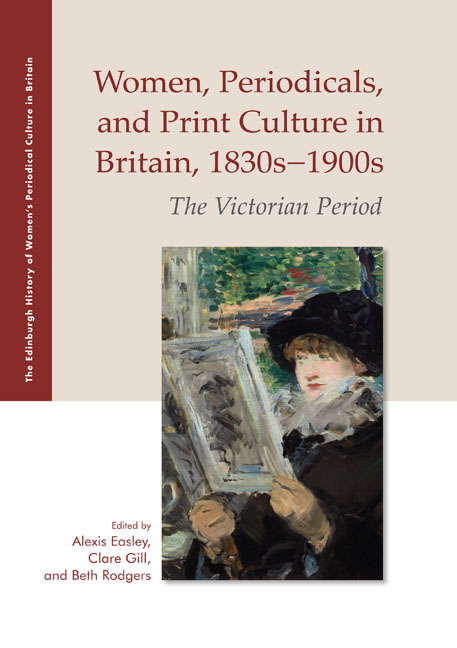Book contents
- Frontmatter
- Contents
- List of Illustrations
- Acknowledgments
- Introduction: Women, Periodicals, and Print Culture in the Victorian Period
- Part I (Re)Imagining Domestic Life
- Part II Constructing Modern Girls and Young Women
- Part III Women and Visual Culture
- Part IV Making Space for Women
- Making Space for Women: Introduction
- 18 Women Journalists and Periodical Spaces
- 19 Making Space for Women's Work in the Leisure Hour: From Variety to ‘Verity’
- 20 Avatars, Pseudonyms, and the Regulation of Affect: Performing and Occluding Gender in the Pall Mall Gazette
- 21 Gender, Anonymity, and Humour in Women's Writing for Punch
- 22 Making Space for Women: The Labour Leader, the Clarion, and the Women's Column
- 23 By the Fireside: Margaret Oliphant's Armchair Commentaries
- Part V Constructing Women Readers and Writers
- Part VI Intervening in Political Debates
- Notes on Contributors
- Index
- Plate section
20 - Avatars, Pseudonyms, and the Regulation of Affect: Performing and Occluding Gender in the Pall Mall Gazette
from Part IV - Making Space for Women
Published online by Cambridge University Press: 25 October 2019
- Frontmatter
- Contents
- List of Illustrations
- Acknowledgments
- Introduction: Women, Periodicals, and Print Culture in the Victorian Period
- Part I (Re)Imagining Domestic Life
- Part II Constructing Modern Girls and Young Women
- Part III Women and Visual Culture
- Part IV Making Space for Women
- Making Space for Women: Introduction
- 18 Women Journalists and Periodical Spaces
- 19 Making Space for Women's Work in the Leisure Hour: From Variety to ‘Verity’
- 20 Avatars, Pseudonyms, and the Regulation of Affect: Performing and Occluding Gender in the Pall Mall Gazette
- 21 Gender, Anonymity, and Humour in Women's Writing for Punch
- 22 Making Space for Women: The Labour Leader, the Clarion, and the Women's Column
- 23 By the Fireside: Margaret Oliphant's Armchair Commentaries
- Part V Constructing Women Readers and Writers
- Part VI Intervening in Political Debates
- Notes on Contributors
- Index
- Plate section
Summary
FOR MOST OF her working life, Marian Evans wrote under the pen name ‘George Eliot.’ Only twice in a career that stretched across four decades did the novelist, poet, short-story writer, reviewer, essayist, and translator publish in the explicit persona of a woman writer. Both of these pieces, each approximately 1,000 words in length, are letters, signed by ‘Saccharissa.’ In marked contrast to her more gender-fluid writing personae, there is no doubt in these cases about her intention to present the work in the voice of a woman. The letters appeared in the correspondence pages of the evening daily Pall Mall Gazette, founded in February 1865 by George Smith, that nineteenthcentury ‘Prince of Publishers’ (Glynn 1986), a friend of Evans's since he published her Romola in serial form in his Cornhill Magazine (1862–3).
Saccharissa, self-described as unimaginative, matronly, and running to fat, with her sugary name and sticky domestic concerns, pens these two letters of complaint to the editor of the Pall Mall Gazette in the early months of that paper's existence. The first, published under the heading ‘Futile Falsehoods’ on 3 April, bemoans false exchanges: shop clerks who claim to be promoting the best interests of their lady customers when patently pushing remainder goods for profit and in the process undermining the views and choices of female customers about matters of taste, clothing, and dress; and the hypocrisy of female friends trading in false pleasantries and cant to a painful extent in the interests of smooth but shallow social intercourse (3 Apr 1865: 2–3). The second letter, published on 13 May and entitled ‘Modern Housekeeping,’ offers another angle on gendered economies and gendered exchanges: it is a heavily ironic account about the difficulties of keeping daughters in fashionable dresses in a middle-class household of modest income with an ‘intellectual’ for a husband who is entirely preoccupied writing short books for a private readership – ‘fit audience though few’ is his telling motto. What is a woman to do when the fixed income of the household stays the same and the cost of living (the price of meat, sugar, lace, ribbons) continues to rise (13 May 1865: 4)?
- Type
- Chapter
- Information
- Women, Periodicals and Print Culture in Britain, 1830s–1900sThe Victorian Period, pp. 336 - 350Publisher: Edinburgh University PressPrint publication year: 2019



